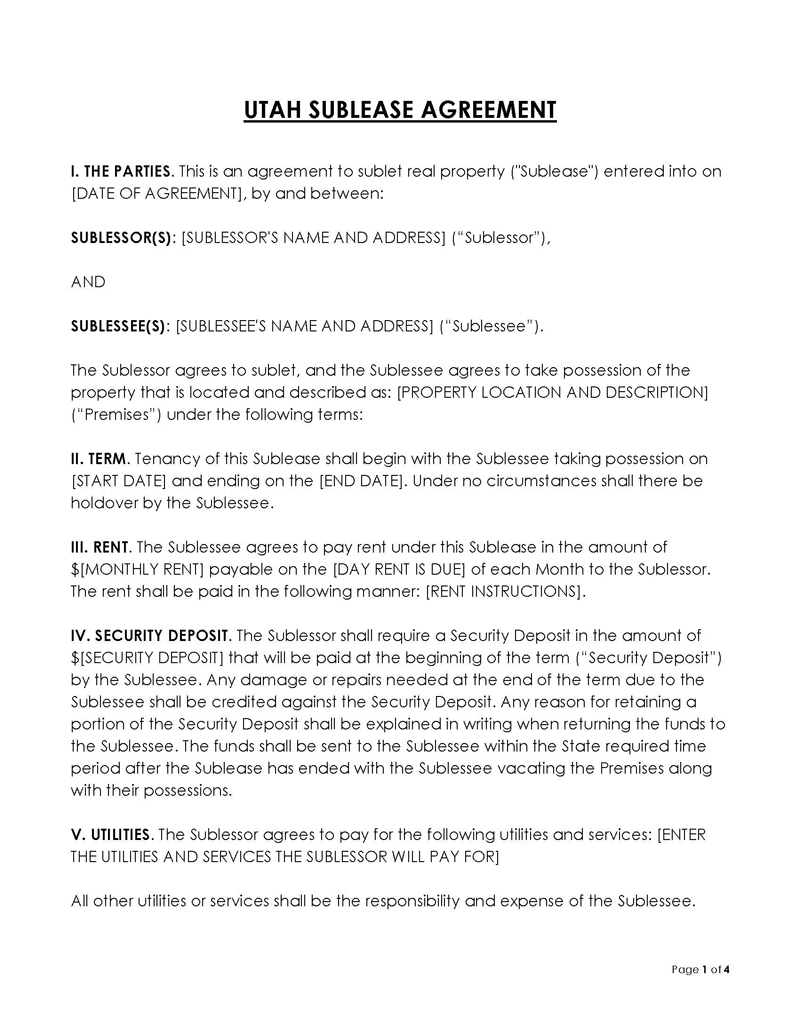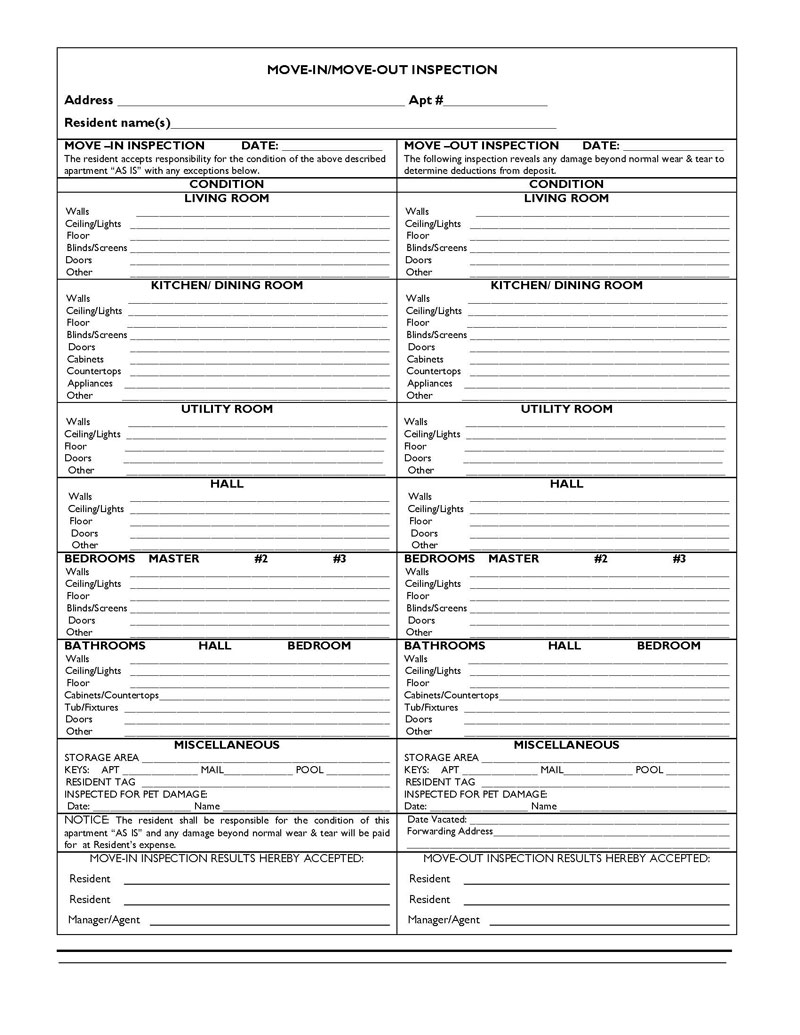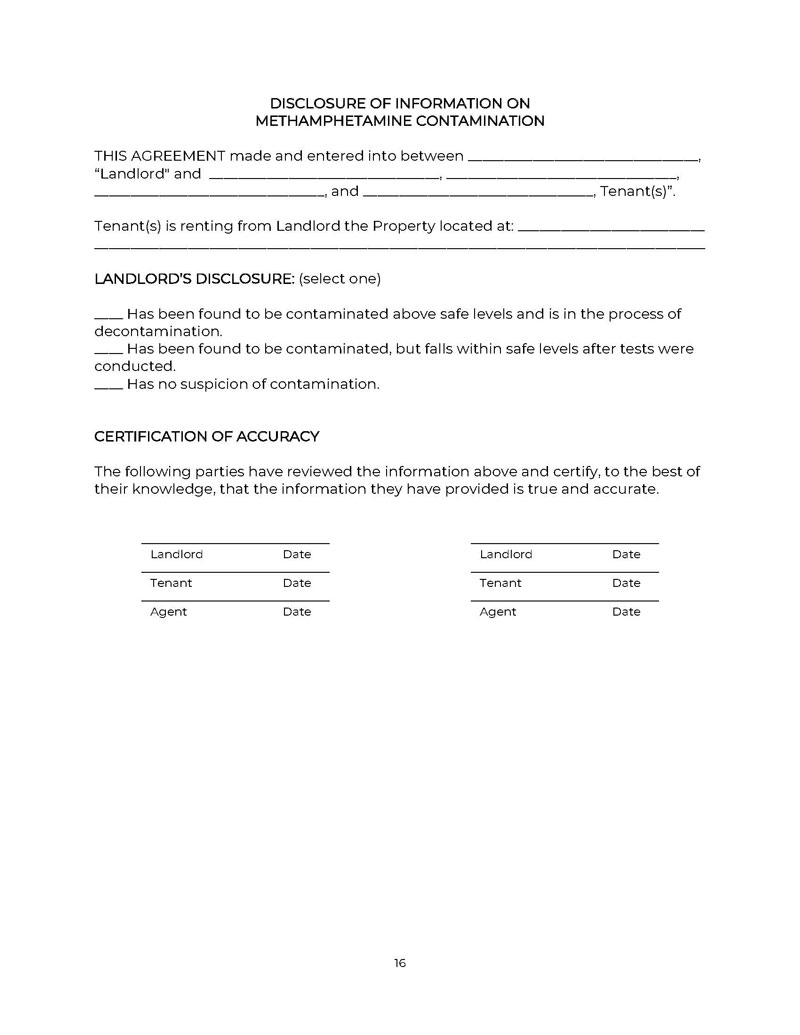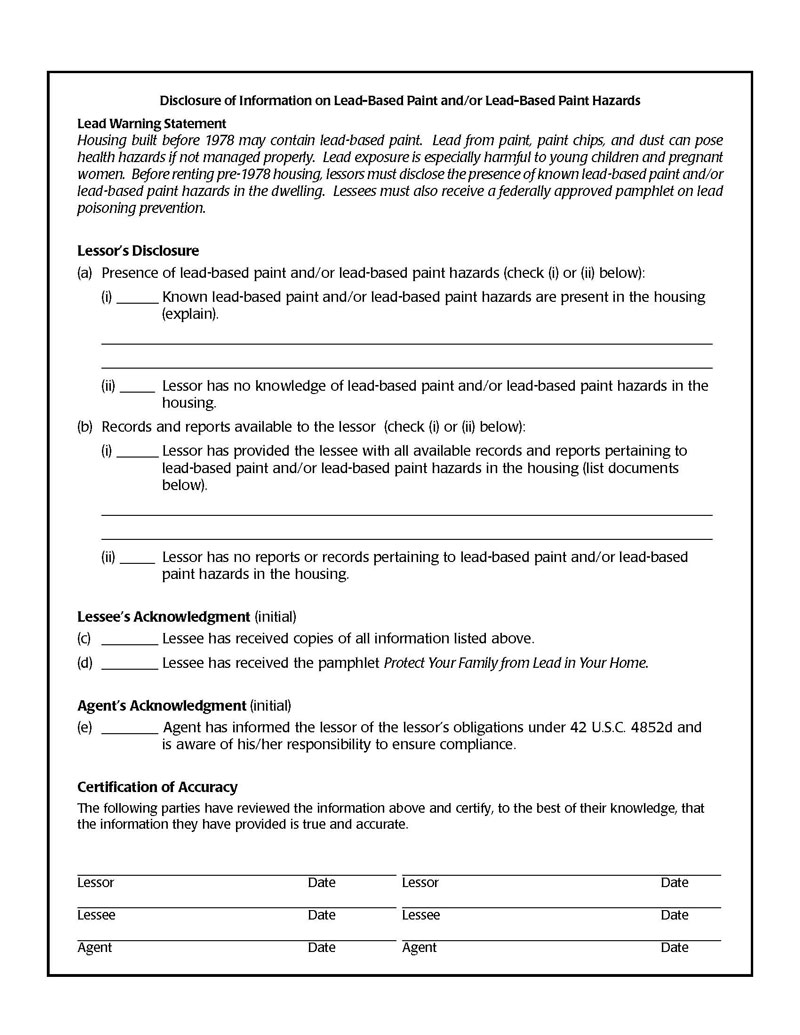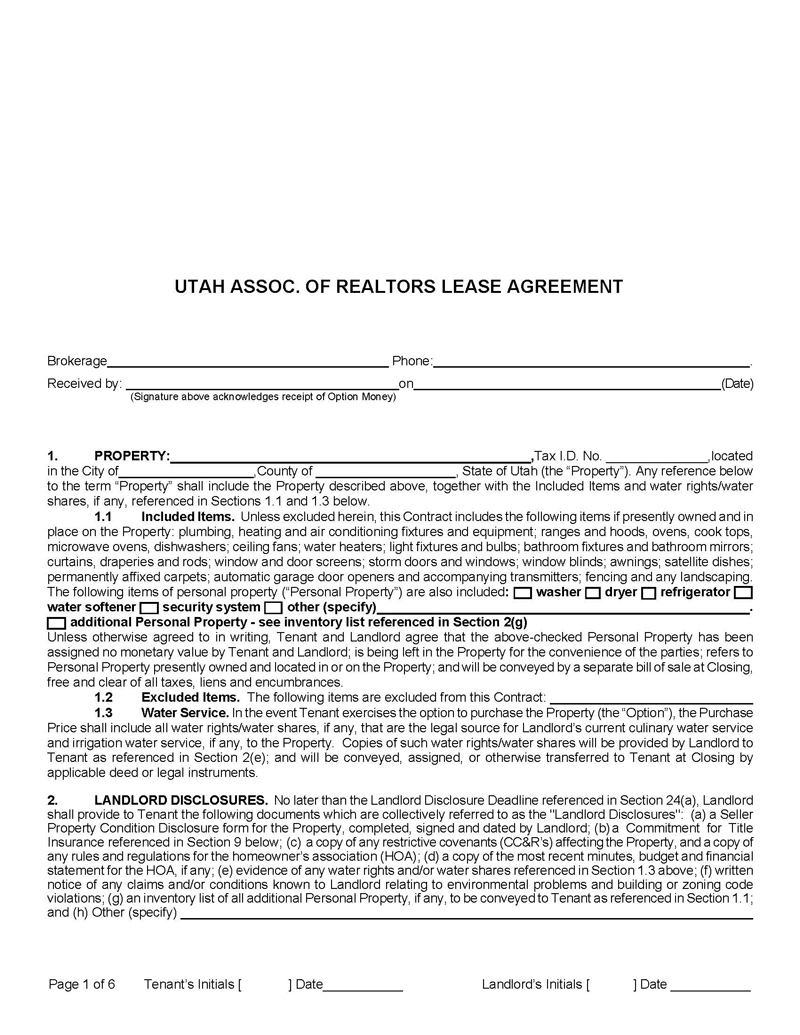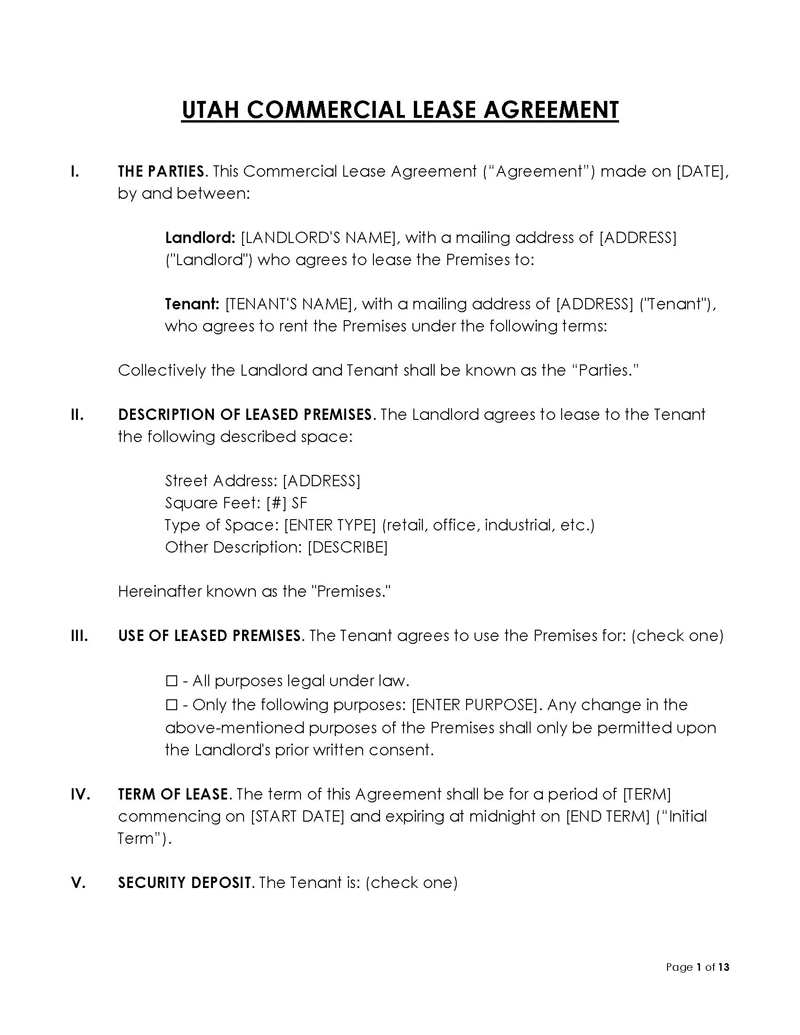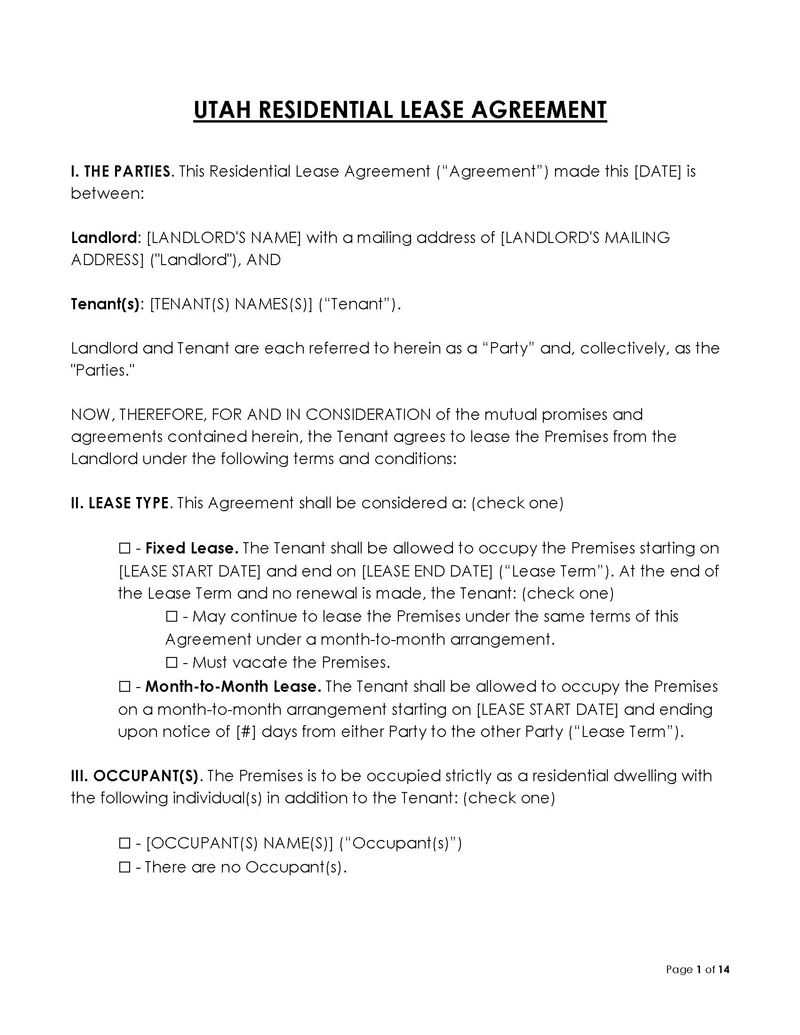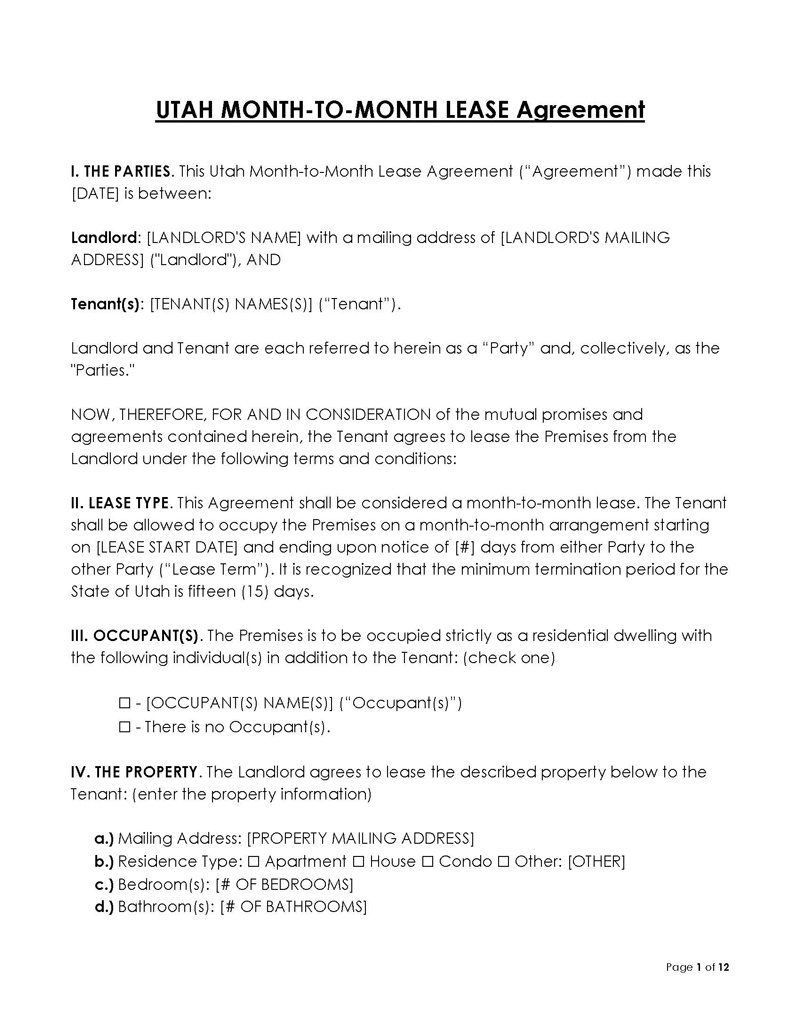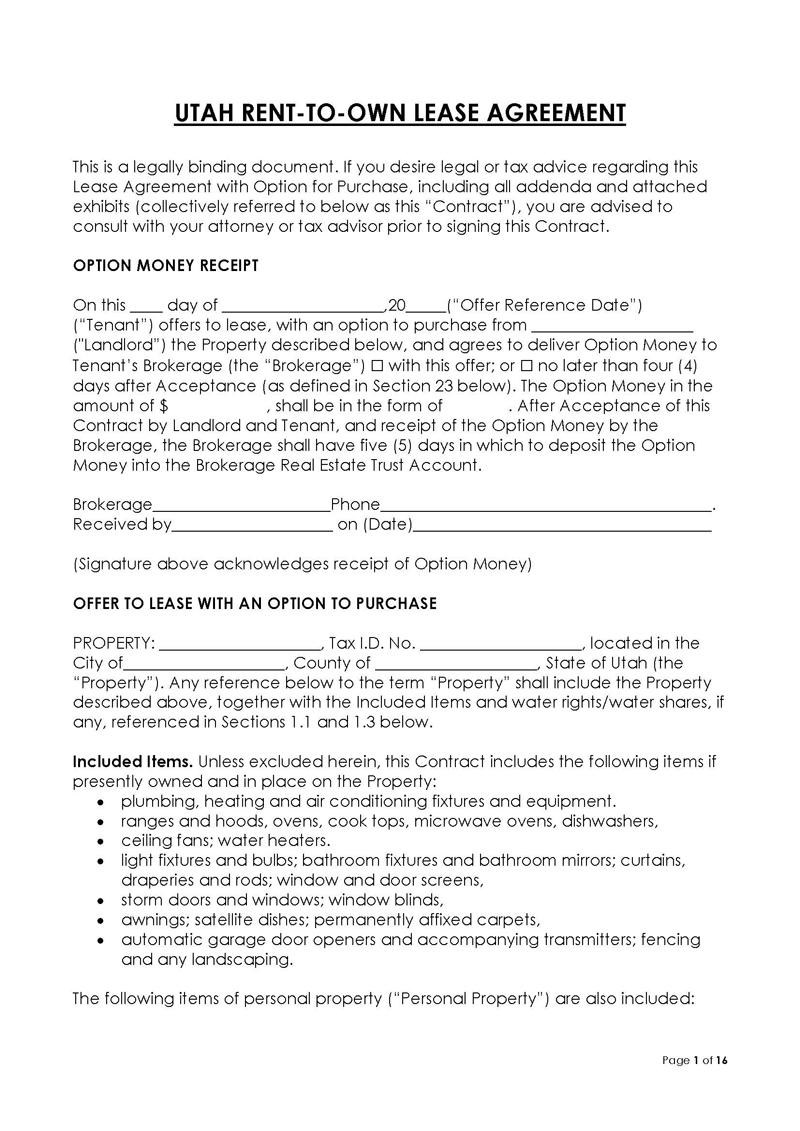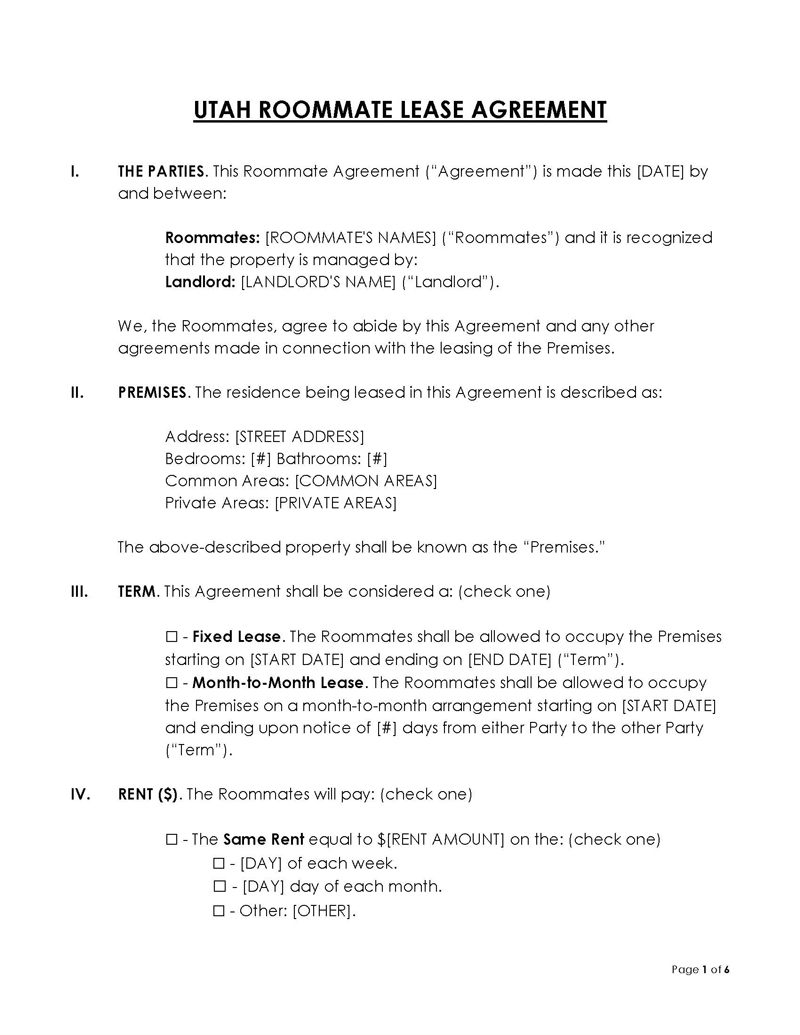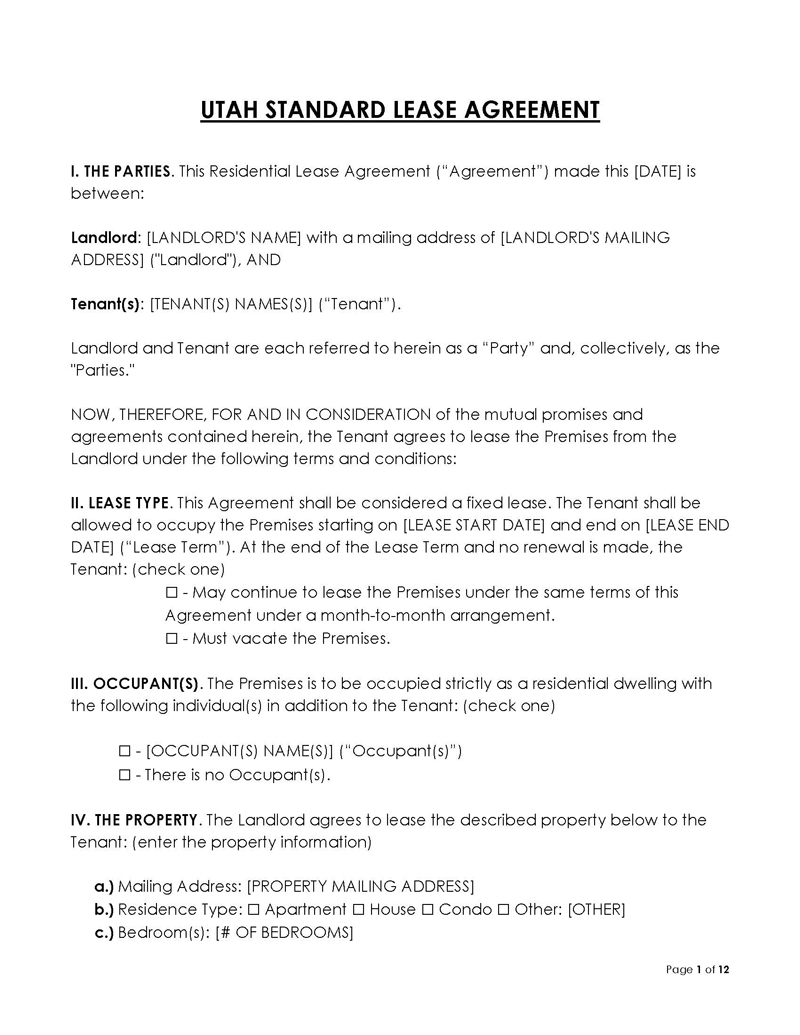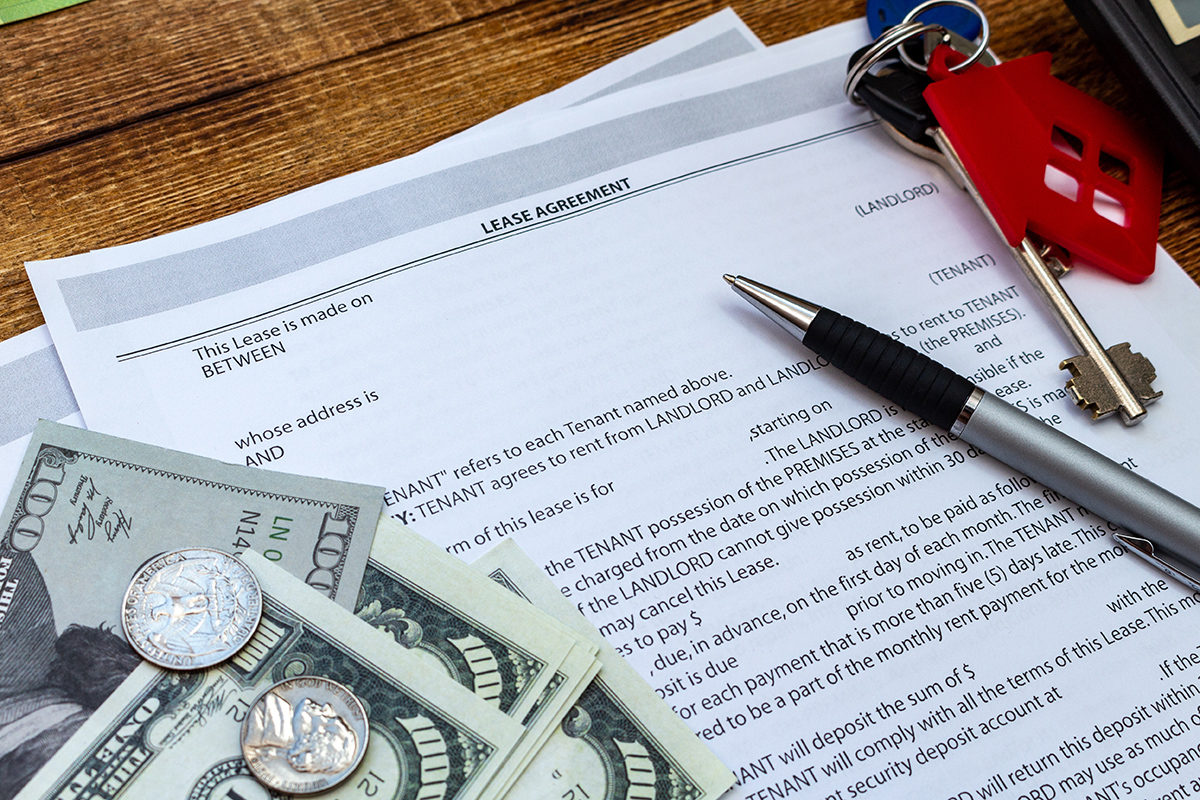A lease agreement is a contract between the landlord (called a “lessor”) and their tenant (or lessee) that governs the relationship between them. Some of the most important aspects of a lease agreement are the duration and rent. It also typically includes additional provisions such as repairs, utilities, and security deposits. In Utah, a lease is only legally binding on the lessor and lessee who sign it.
When leasing a property, property owners want certain rules and laws to be implemented. A lease agreement allows them to communicate the rules of tenancy and the terms and conditions of the lease. Utah law requires that agreements to rent residential and commercial property be in writing and signed by both parties before they become effective. The intent of this legal requirement is to provide a written record of the agreement, thereby avoiding disputes over the terms and conditions agreed upon and encouraging landlords to be more thorough in discussing their respective rights and duties. Consequently, both parties are legally obliged to fulfill the contract’s requirements. If they do not, the at-fault party may be held liable for damages or other relief to compensate for any losses caused by their failure.
However, to avoid conflicts, it is highly important for a landlord to vet their tenants by conducting background, criminal, and credit checks before leasing a property to them. To further learn how such agreements are executed, landlords can review the User Manual to Renting (from the Utah Apartment Association), the Utah Renter’s Handbook, and the Utah Renter Toolkit. In addition to that, this article will discuss the fundamental properties of such agreement, disclosures, and the different types of leases in Utah.
Free Templates
What You Need to Know About Lease Agreement Laws in Utah
The purpose of a lease agreement is to clearly define the lessor’s and lessee’s contractual obligations, safeguarding both parties’ interests and promoting a less tense working relationship. To achieve this, the agreement ought to have clauses that discuss specific aspects of the lease stipulated by Utah landlord-tenant laws.
Some of the aspects addressed by these agreements included the following;
Warranty of habitability
According to the law, the landlord is obligated to guarantee the habitability of the premises by assuming some obligations. They must provide functional heating and cooling systems, plumbing lines, electricity, and running water. Additionally, they must ensure that the common areas are clean and that the repairs (essential and non-essential) are fixed within 3-10 days. If they fail to do this, tenants are allowed to withhold rent or deduct repair costs from the rent.
Evictions
Lease agreements do not override the Utah Residential Landlord and Tenant Act. Landlords are authorized to evict tenants who disobey the terms of this agreement by engaging in illegal activity or failing to pay rent. However, they are only allowed to do so by issuing a 3-day notice.
Security deposits
In general, a security deposit is a sum of money (usually one or two months’ rent) that the landlord collects as security. This deposit is not considered rent and cannot be used for that purpose. Utah laws do not impose a limit on how much can be charged as a security deposit. However, landlords are required to return the money 30 days after the lease expires – (§ 57-17-3(2)). Nevertheless, the landlord can use the money to cover damages caused by the tenant beyond normal wear and tear. Landlords are required to mention the security deposit in writing, which is usually attached to the lease agreement as an addendum.
Lease termination
A lease agreement is a legally binding contract in Utah. Once executed, both parties agree upon the end date. This can either be fixed or indefinite. In an indefinite contract, there is no end date, and the contract may be terminated by the landlord if there are legal reasons. The time of notification must be noted in your rental agreement.
Fixed leases have an end date for the rental agreement, and the contract cannot be ended prematurely. The landlord will be penalized if he decides to end the contract early. Only under specific conditions, such as military deployment or active military duty, being uninhabitable, domestic violence, or landlord harassment, are fixed leases subject to early termination by tenants.
Rent increases & fees
Landlords are permitted to increase the rent as frequently and by as much as they desire, without prior notice. Furthermore, with the exception of returned check fees, they can impose service fees without notice on all services. They cannot charge more than $30 for returned checks.
Landlord entry
A landlord has the right to enter the property as often as necessary for upkeep, repairs, and inspections. They must give prior notice of 24 hours according to § 57-22-4(2). However, notice is not required in emergencies.
Settling legal disputes
Other than eviction cases, disputes under leasing agreements can be settled in Small Claims Courts. In this case, the value of the dispute should not exceed $10,000.
Required Lease Disclosures
The laws in Utah require that landlords disclose specific information to their tenants before renting their properties. A disclosure or addendum is a provision that is not included in the contract but states a fact that was not explicitly discussed. These disclosures bring transparency to the terms and conditions of the lease.
Some of these disclosures include:
Move-in checklist
Under (§ 57-22-4(3)), every landlord is legally required to provide a move-in checklist and discuss it with the tenant prior to the signing of the lease contract. The checklist should contain the condition of the rental unit, essential utilities, and appliances. The tenant(s) will then be given enough time to conduct their own inspection of the property and report their findings to the landlord or his representative. This can be done in conjunction with a walkthrough inspection by the landlord.
Methamphetamine contamination disclosure
Landlords are required to disclose the current condition of their properties with respect to contamination by methamphetamines. This disclosure is meant to protect tenants from unwittingly renting contaminated rental units. Consequently, the landlord is obligated not to rent any methamphetamine-contaminated unit until it is decontaminated.
Lead-based paint disclosure
In some circumstances (rental units built before 1978), it may be necessary to disclose known defects in the unit and potential lead-based paint hazards. Such defects include, but are not limited to, peeling paint on interior walls, peeling or chipped exterior paint, and cracked or chipped exposed wood in the walls, ceilings, floors, or floors of cabinets. In such a case, the landlord must disclose these defects to tenants, thus maximizing their safety. The disclosure should be accompanied by a pamphlet detailing all known dangers of lead-based paint.
Types of Lease Agreements Used in Utah
Based on the tenancy period, lease terms, and live-in agreements, lease agreements are typically divided into various types. As a result, landlords in Utah may have to create different lease agreements to meet the requirements of each tenant, even for the same rental unit.
Some of the main types of agreements executed in Utah are the following:
Association of Realtors
Realtors can help landlords find tenants for their rental properties. In such cases, the realtor assumes the landlord’s duties of marketing the rental unit, screening applicants, negotiating terms, and creating the lease agreement in exchange for a commission. In such a scenario, the realtor’s lease agreement could apply. This type of agreement is used in residential leasing.
Commercial lease agreement
These agreements are used in commercial leasing by landlords who own or manage real estate for professional, commercial, or industrial uses. These kinds of leases give the landlord the ability to collect rent from tenants who only intend to use the space for business purposes rather than residing there. Examples of such rental units include offices, warehouses, retail shops, etc. It is typically more detailed and complex in nature.
Residential lease agreement
As the name suggests, this type of agreement is used for leasing residential properties. It is usually executed for apartments or houses.
Month-to-month lease agreement
It is used to lease a property for an indefinite period without a fixed end date. As a result, the agreement renews every month. In Utah, either party may end the contract by giving the other a 15-day notice ( 78B-6-802).
Rent-to-own lease agreement
A rent-to-own agreement is used when a landlord offers the tenant the option to purchase the rented property at the end of the lease term. As a result, the rent is paid by the tenant throughout the term of the lease, and in some cases, a portion of the rent is used to offset the cost of the purchase.
Roommate lease agreement
Another type of agreement is the roommate lease agreement. This type of contract is meant for tenants who are sharing the same premises or rental unit. This agreement outlines the expectations of each roommate and guidelines for co-existing. The agreement will also specify how much of the utilities and other costs each roommate will pay. It is subject to guidelines under Title 57 (Real Estate).
Standard lease agreement
Standard leases are agreements with a start date and an end date. Ordinarily, the lease will have a 1-year duration. This type of agreement is common among residential leases.
Sublease agreement
A sublease agreement is typically used when a tenant decides to vacate the property before the tenancy term ends and asks the landlord if they can sublease the rental unit to someone else until the expiration of the lease period. The sublessor will pay rent to the original tenant, who will then pay the landlord or the lessor directly. The original lease remains in effect up to the expiration date.
Rental Application Form
This is a brief or, in some cases, an extensive application form that a landlord can use to screen tenants before making an offer. Landlords make several copies and distribute them to prospective tenants to complete. Information provided by the applicants is used to select the most suitable tenant.
Conclusion
Different types of property lease agreements can be used to suit different requirements for leasing property in Utah. Each type has its own distinct features, which vary according to the nature of the lease. As a result, a landlord needs to be familiar with all of them so that they can choose the best contract for their property as well as for prospective tenants. Guidelines for properly executing a lease agreement are provided by Utah’s leasing law. To prevent non-compliance cases, a landlord must exercise due diligence in accordance with good estate practices and observe all state laws pertaining to their obligations as a landlord.
